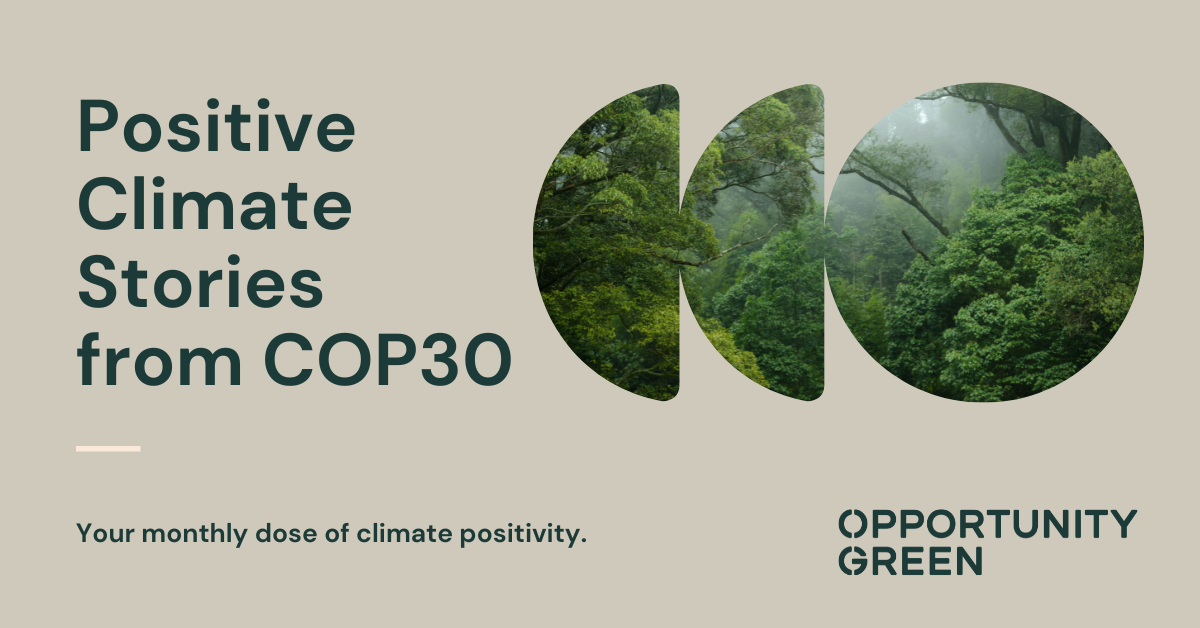Positive climate stories in March
Our monthly round-up of uplifting news about climate change. From a new High Seas Treaty to a landmark resolution on climate justice, there’s plenty to be positive about in March.
1. Historic agreement to protect 30% of world’s oceans
It’s taken nearly 20 years of discussion, negotiation and advocacy to navigate many thorny geopolitical issues by United Nations member countries. But this month, a landmark agreement was finally reached to protect international waters and marine biodiversity.
As Rana Lee, the conference chair, announced when the historic agreement was concluded: “The ship has reached the shore.”
Until now, only about 1% of these so-called ‘high seas’ has been protected, because they lie outside national boundaries. The new agreement is a big deal because almost two-thirds of these oceans will fall under the scope of the agreement.
The new High Seas Treaty will lay down a new legal framework so that vast marine protected areas (MPAs) can be established, helping to achieve the global goal of protecting 30% of the world's oceans by 2030.
Like so many other climate change NGOs, we’re thrilled to see this multilateral push for ocean protection. But now we want to know how it will reshape international shipping practices. It will take time for the text to be adopted and it remains to be seen how the provisions established under the treaty for MPAs will be actioned by countries. Still, we have high hopes that we’re moving in the right direction.
Our CEO Aoife O’Leary commented in this blog for Chatham House:
“It was a historic moment that offered two genuine causes for celebration: firstly, a more hopeful future for our ocean and, secondly, a welcome reminder in turbulent times that multilateral collaboration can deliver meaningful progress.
“As with all multilateral processes, what the treaty delivers, after 20 long years, is a framework for cooperation and collective commitment, awaiting bold action by national leaders.”
2. 29 March 2023 – to be remembered as “International Climate Law Day”
March was a great month for levelling out climate inequalities, especially 29 March 2023, dubbed as “International Climate Law Day”.
The General Assembly of the UN adopted a landmark resolution on climate justice advanced by Pacific island state Vanuatu and youth activists. The resolution will secure a legal opinion from the world’s highest court, the International Court of Justice (ICJ), on states’ obligations concerning the climate crisis. The ICJ will answer two questions: first, what states’ obligations are to mitigate the climate crisis, and second, what the consequences are for failing to do so.
While the ICJ has no enforcement powers, it’s thought that this kind of support could influence international negotiations and climate lawsuits, ultimately benefiting climate vulnerable countries.
As Ishmael Kalsakau, prime minister of Vanuatu, said: “We have witnessed a win for climate justice of epic proportions.”
Today is the big day! Incredible journey to get here, amazing effort from everyone involved. Thank you to our team in capital, the core group 🇻🇺🇦🇴🇦🇬🇧🇩🇨🇷🇫🇲🇲🇦🇲🇿🇳🇿🇩🇪🇱🇮🇵🇹🇷🇴🇼🇸🇸🇱🇸🇬🇺🇬🇻🇳, our @PSIDSnyc family and all UN members. Follow live beginning at 10am ET. Statements on the… https://t.co/nR5cRZhkjd
— Vanuatu UN (@VanuatuUN) March 29, 2023
The same day, the European Court of Human Rights heard its first two climate lawsuits. The cases were brought by a group of senior Swiss women and a former French mayor against their respective governments. Both cases alleged human rights violations due to insufficient climate policies.
Corina Heri, postdoctoral researcher at the Institute of Law of the University of Zurich, said:
“What the court decides on these questions will be defining for its other climate cases, and will send strong signals to courts all across the Council of Europe, and around the world.”
Lastly, 29 March 2023 also witnessed a major moment on the legislative front: The European Parliament proposed including the crime of ecocide into the EU’s revised environmental crime directive.
Philippe Sands KC found this to be a “most significant first step, as the EU seeks to play a leadership role in taking the region and the world to a more benign environmental future”.
3. France contributes €30,000 to the IMO's Voluntary Multi-Donor Trust Fund
We went into March’s round of talks at the International Maritime Organization (IMO) feeling optimistic that the shipping industry would step up and take meaningful action on climate change ahead of adopting its revised GHG Strategy in July.
While the week-long discussions delivered a mixed bag of outcomes, there were clear signals of broad support for zero emissions by no later than 2050.
The defining positive moment for us, though, was the announcement of a new Voluntary Multi-Donor Trust Fund to provide financial support to climate vulnerable countries in attending the meetings. And it was exciting to see France make the first contribution of €30,000.
“There is no equity nor fairness in the decision-making process, if climate vulnerable Member States are unable to take part in these meetings and have their say in the final outcome of the negotiations - particularly when there is so much at stake for these nations, most impacted by climate change. Thus, this ought to be only one of many such contributions to the Fund to follow from other Member States and organisations, in the near future,” says our Shipping Manager Ana Laranjeira.
Exciting news from the @IMOHQ: France gave €30,000 to the multi-donor trust fund to support the participation of Climate Vulnerable Countries in the hugely important discussions on reducing the climate impact of international shipping.
— Opportunity Green (@opp_green) March 24, 2023
Let's hope other countries follow! 🎉🇫🇷🙌
4. Four-day week is good for wellbeing and for climate
The results of a four-day week trial were published this month and its been hailed as a resounding success. The six-month scheme involved 61 companies, who paid staff their normal salary to work one day less each week. It was seen as such a success that 56 companies have extended the four-day week and 18 have made it permanent.
The report found that this working pattern had “extensive benefits” on employee wellbeing. It also found that the majority of companies were happy with productivity and performance levels. While only 23 of the employers taking part provided financial data on revenues, the data that was provided showed that revenue broadly stayed the same during the six months of the trial.
But how does working less impact climate change? According to experts, the environmental gains can be as far-reaching as the business benefits.
"We have a lot of research showing that over time, as countries reduce hours of work, their carbon emissions fall," says Juliet Schor, an economist and sociologist at Boston College and lead researcher at 4 Day Week Global.
Studies show that a four-day week leads to a drop in commuting, having significant impact on our carbon footprint. Beyond that, a shorter working week has proven to increase positive sustainable behaviour, such as volunteering for environmental causes, buying more eco-friendly products and paying more attention to recycling.
Here at Opportunity Green, we’re enthusiastic followers of the four-day week idea. So much so that we’re trialling the idea for ourselves, starting in June. Of course, there will be bumps along the way, but we’re looking forward to finding out how this working pattern will bring all-round benefits to both employees and the environment. We’ll keep you posted as we progress.
5. Renewables will be world’s top electricity source within three years
This is welcome news for the future of energy supply. According to Carbon Brief, renewables will cover almost all of global electricity demand growth in the coming three years.
This is based on analysis of figures in the International Energy Agency (IEA) electricity market report 2023. It shows that, if renewables are combined with resurgent nuclear power, it will provide more than enough electricity for growing demand between 2022 and 2025.
While nuclear power is part of the mix, this combination will mean that fossil fuels will start to be squeezed out by clean-energy sources. And drilling down further into the data shows that renewable generation is expected to cover 98% of the overall increase in global demand for electricity.
What positive climate stories have lifted your spirits this month? Share it with us on Twitter or LinkedIn and we’ll help to spread the word.











